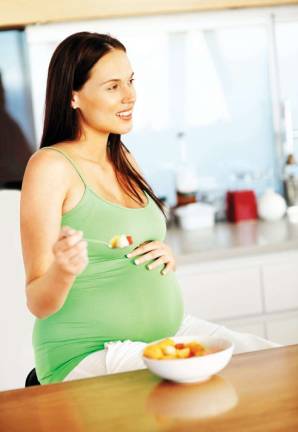Healthy Eating Tips for Pregnant Women

By John Friia Once a woman discovers she is pregnant, everything changes, from what she can do to what she can eat. When it comes to dietary changes, the goal is to try to eat the types of food that are beneficial for your growing baby. With such a wide variety of foods to choose from, it may be difficult and confusing to find out what food is best to eat. According to the U.S. Department of Health & Human Services (HSS), pregnant women should add foods that contain protein, iron, calcium and folic acid to their diet, because this is the time when their bodies need those nutrients the most. Everyone has heard the saying that pregnant women are "eating for two," but that should not be taken as an excuse to eat huge quantities; instead you should try to consume healthier foods that will be valuable for your child as well as you. During pregnancy, women will gain weight, but the amount varies depending on how much the mother weighed prior to being pregnant. "Most women need 300 calories a day more during at least the last six months of the pregnancy than they do pre-pregnancy," says WomensHealth.gov, an HHS project. There is a special food pyramid that was created to show what foods women are encouraged to eat to supply themselves with the proper nutrients. Starting off with grains, foods in this category include bread, cereal, rice and pasta. For both vegetables and fruit, as long as they are fresh, they will be healthy for both the mother and child. In the dairy section, low-fat yogurt, skim or low-fat milk are recommended. Finally, in the meat and beans category, a selection of cooked beans and peas, lean beef, shrimp and others will be beneficial. There are some foods that pregnant women should be cautious about eating: refrigerated, smoked seafood and meat; store-made chicken, egg or tuna salads; some seafood; and herbs used as medicine unless prescribed by a doctor. Moms-to-be are warned to stay away from such foods because they can be contaminated with salmonella and other harmful substances. Seafood-shark and swordfish, for example-can have high levels of mercury, which can damage the child's development. The amount of food to consume varies depending on the trimester that a woman is in. During the first trimester, a woman should eat 6 ounces of grains daily, but when she enters her second trimester the amount changes to 8 ounces daily. Other than making sure the mother is well fed, it is important to remain hydrated during pregnancy. It is suggested that women drink 10 cups of fluid a day. A common belief is that pregnant women shouldn't drink caffeine, but in reality it is safe to drink small amounts that are less than 200 mg of caffeine a day. On top of healthy eating habits, it is important to take vitamins during pregnancy. Following the recommended guidelines will allow the mother to properly care for their child and make sure he or she grows and develops properly in the womb.